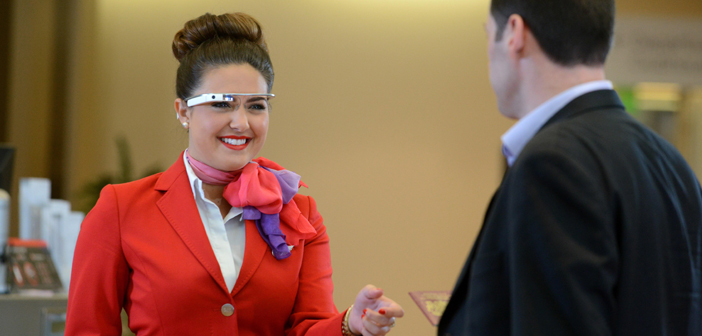Virgin Atlantic Trialing Wearable Tech at London Heathrow
If you happen to be a high-flying international businessperson of some repute, you should imminently find yourself receiving a more smoothly personalized reception when going through London’s Heathrow airport, as Virgin Atlantic has announced that it will henceforth be testing Google Glass and Sony Smartwatch products in a six-week pilot scheme (no pun intended, presumably) intended to speed up check-in and boost customer service.
Outlining the Benefits
Flying is a drawn-out affair at the best of times, involving the enactment of stringent security policies ostensibly required to protect us from evil terrorists and deadly nail clippers. The advent of online check-in has helped quite a bit, but the process is still fundamentally inefficient, especially given the exorbitant cost of upper class travel. In this test run, concierges will make use of their equipment to access passenger information through an app designed to distribute it appropriately. In other words, when a passenger disembarks, the airline service system will allocate their details to an available staff member who will be able to cater to their specific needs.
This smart service may inform concierges of relevant regional weather information, provide translation for foreign language speakers, or flag local events suiting passengers’ interests, and this is just an early implementation. With a huge amount of smartphone-sourced information to draw from, it could automatically fulfil dietary preferences or requirements (learning about a customer’s peanut allergy, for instance, and working around it), select optimal seats based on prior feedback concerning location and/or cost, or even assist the staff with meeting broader cultural or personal needs pertaining to the brief interactions required of them.
Engaging a Maturing Concept
Ever since the reception of Google Glass demonstrated that people are ready to be forward-thinking in the way they use the computational advancements available to them, there’s been a real buzz around the wearable tech industry. Still, it’s tough to tell sometimes whether a sector like this is actually booming or just appearing to be, as it’s much easier to recognize that something has potential than it is to actually make people want it. People like watches, and they like smartphones, so why wouldn’t they want a mixture of the two? The problem is that the process of combination does not always enhance things, and indeed has the potential to diminish them. It suffices to say that I’ve been a little skeptical about adhering gadgets to myself, particularly since we’ve yet to see the right mixture of features and affordability come along and achieve mainstream appeal.
For those reasons and more, it’s nice to see a real-world example appear and give us a reason to take smart glasses and watches more seriously. Virgin has a reputation for investing in the future—most notably, perhaps, with its nascent Virgin Galactic program—so it isn’t surprising that they’re forging ahead with this. It makes total sense that if things aren’t quite at the point where these devices can be as ubiquitous as iPhones, they can at least be made great use of in situations where cost is not an issue.
Trickle-Down Convenience
Since I’m a normal guy in possession of standard shoes and fewer than lots of dollars, I’d like to know when regular plane-going folk will start to get this kind of experience. Sure, the individually-assigned concierge service will never be open to everyone as the labor costs would be enormous, but any and all of the computerized aspects would incur minimal additional expenditure in being extended to everyone. I’m not going to confidently predict a big leap in airport operation, though, as this part of the SITA article has me concerned:
Dave Bulman, Director of IT, Virgin Atlantic, said: “While it’s fantastic that more people can now fly than ever before, the fact that air travel has become so accessible has led to some of the sheen being lost for many passengers.”
That says it all, really. This scheme isn’t really about making things more efficient; it’s about adding a new category of luxury to flying so as to allow big spenders to feel special. Even so, when the technology gets cheap enough, it will inevitably make its way into the realm of lower class travel, so the wealthy among us should start dreaming up some new things to help them stand out. Maybe airlines could have special hats saying “I have great big bags of money” and only hand them out to rich passengers. Something to think about, anyway.

